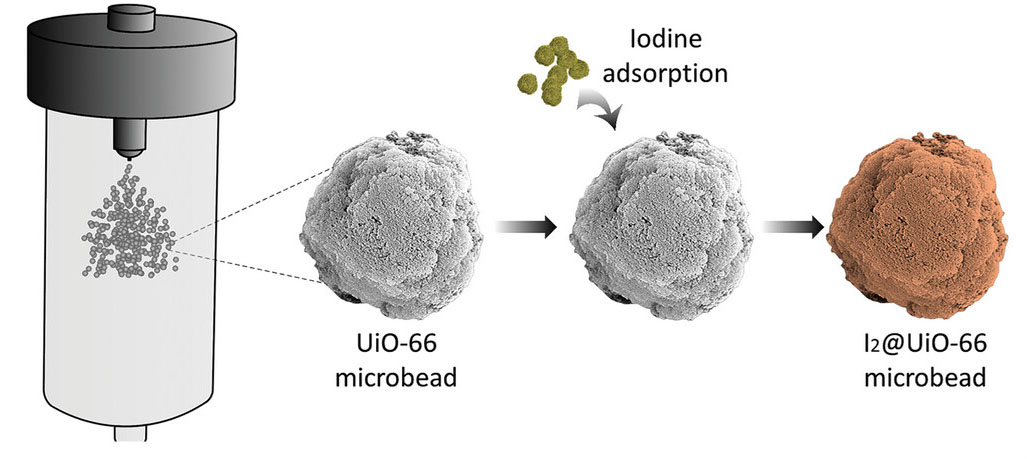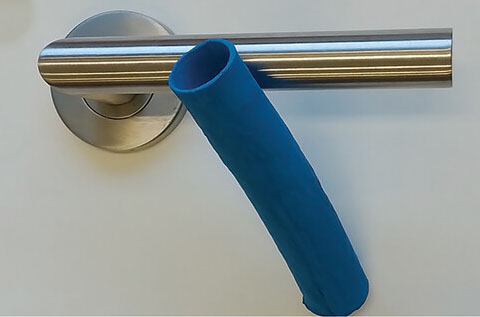| Jun 05, 2024 | |
Antimicrobial door handle covers using metal-organic frameworks prevent infections |
|
| (Nanowerk Spotlight) Hospitals and healthcare facilities have long battled the persistent threat of nosocomial infections, which are illnesses contracted by patients during their stay for unrelated treatments. These infections, particularly concerning for immunocompromised individuals, contribute significantly to patient mortality and pose a major public health challenge. Despite rigorous hygiene protocols and the use of traditional antimicrobial coatings, the transmission of pathogens via frequently touched surfaces like door handles remains a pressing issue. | |
| Researchers have been seking effective solutions to reduce the spread of infections in healthcare settings. Antimicrobial coatings, which often incorporate biocidal agents into polymers or hydrogels, have emerged as a promising prophylactic strategy. However, these coatings have faced limitations such as microbial resistance, inconsistent performance under real-world conditions, and potential toxicity concerns. | |
| In recent years, the field of metal-organic frameworks (MOFs) has opened up new possibilities for developing innovative antimicrobial coatings. MOFs are highly porous crystalline materials composed of metal ions or clusters connected by organic linkers. Their unique properties, including large surface areas and the ability to host a variety of guest molecules, have made them attractive candidates for various applications, from gas storage to drug delivery. | |
| Now, a groundbreaking study led by researchers from the Catalan Institute of Nanoscience and Nanotechnology (ICN2) has harnessed the power of MOFs to create antimicrobial door handle covers that could significantly reduce the transmission of pathogens in healthcare environments. The research team, headed by Dr. Inhar Imaz and Dr. Daniel Maspoch, has developed a novel approach that integrates iodine-loaded MOF microparticles into a potentially biodegradable polyurethane polymer. | |
| They reported their findings in Advanced Materials ("Metal–Organic Framework-Based Antimicrobial Touch Surfaces to Prevent Cross-Contamination"). | |
| The key innovation lies in the use of MOF particles as both storage reservoirs and delivery systems for biocidal iodine. The researchers synthesized pseudo-spherical UiO-66 microparticles, a type of zirconium-based MOF known for its exceptional stability and porosity, using a spray-drying technique. They then loaded these microparticles with iodine, a highly effective topical antimicrobial agent with a broad spectrum of activity and no reported cases of resistance. | |
 |
|
| Schematic illustration of the formation of iodine-loaded UiO-66 microparticles, starting with the spray-drying synthesis of UiO-66 microparticles and concluding with the adsorption of iodine within the microparticles. (Image: Reprinted from DOI:10.1002/adma.202403813, CC BY) | |
| By incorporating the iodine-loaded UiO-66 microparticles into the polyurethane polymer, the researchers created antimicrobial films that could be fashioned into door handle covers. These covers were designed to slowly release iodine over an extended period, providing a constant antimicrobial effect. | |
| To evaluate the efficacy of their invention, the research team conducted a series of experiments simulating real-world touching conditions. They contaminated the door handle covers with various pathogenic microorganisms, including Gram-positive bacteria like Staphylococcus aureus and Enterococcus faecalis, Gram-negative bacteria such as Escherichia coli, Pseudomonas aeruginosa, and Acinetobacter baumannii, and the fungus Candida albicans. | |
| Remarkably, the door handle covers completely inhibited the transmission of all tested pathogens, maintaining efficacy through multiple contamination cycles and cleaning with a commercial disinfect. | |
| The researchers also addressed concerns about the potential skin irritation caused by iodine exposure. By storing the iodine inside the MOF particles, the door handle covers minimized direct contact with the skin. In vitro cytotoxicity tests using human keratinocytes confirmed that the covers were unlikely to cause skin irritation under normal use conditions. | |
| Another notable aspect of this invention is the long-lasting antimicrobial effect. The researchers found that the iodine release from the door handle covers followed a hindered Fickian diffusion model, allowing for a slow and sustained release over an estimated period of nearly two years. This prolonged efficacy could significantly reduce the need for frequent replacements and maintenance. | |
| While primarily tested in healthcare settings, the antimicrobial door handle covers could potentially find applications in various public spaces, such as schools, offices, and transportation hubs, where the risk of pathogen transmission is high. Furthermore, the versatility of MOFs opens up possibilities for incorporating other biocidal agents or even multiple agents within the same coating, potentially broadening the spectrum of antimicrobial activity. | |
 |
|
| Photograph of the door handle cover made of polyurethane film with UiO-66 microparticles loaded with iodine. (Image: Reprinted from DOI:10.1002/adma.202403813, CC BY) | |
| As healthcare facilities seek effective solutions to minimize the transmission of pathogens, the development of MOF-based antimicrobial coatings like these door handle covers offers a promising avenue for creating safer environments. The covers remained effective for three consecutive touching simulations, as demonstrated in the study, highlighting their potential to prevent cross-contamination in high-traffic areas. | |
| While the original study primarily focused on healthcare environments, the antimicrobial door handle covers could potentially find applications in various public spaces, such as schools, offices, and transportation hubs, where the risk of pathogen transmission is high. However, further research would be necessary to validate their effectiveness in these settings. | |
| The researchers acknowledge that further studies are needed to optimize the manufacturing process and assess the long-term performance of these covers in real-world settings. They stress the importance of continued research and refinement to ensure the covers' effectiveness and practicality before widespread implementation. | |
| As the world continues to grapple with the challenges posed by infectious diseases, innovations like the MOF-based antimicrobial door handle covers offer hope for a future with reduced pathogen transmission and improved public health outcomes. With ongoing research and development, these innovative materials could become a standard feature in hospitals and other high-traffic areas, helping to protect the health and well-being of countless individuals. | |
 By
Michael
Berger
– Michael is author of three books by the Royal Society of Chemistry:
Nano-Society: Pushing the Boundaries of Technology,
Nanotechnology: The Future is Tiny, and
Nanoengineering: The Skills and Tools Making Technology Invisible
Copyright ©
Nanowerk LLC
By
Michael
Berger
– Michael is author of three books by the Royal Society of Chemistry:
Nano-Society: Pushing the Boundaries of Technology,
Nanotechnology: The Future is Tiny, and
Nanoengineering: The Skills and Tools Making Technology Invisible
Copyright ©
Nanowerk LLC
|
|
|
Become a Spotlight guest author! Join our large and growing group of guest contributors. Have you just published a scientific paper or have other exciting developments to share with the nanotechnology community? Here is how to publish on nanowerk.com. |
|
